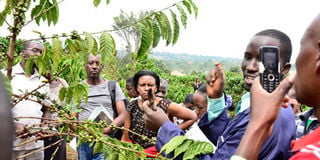Luweero sets coffee production target

Farmers look on as a coffee expert explains the agronomy of the crop. Farmers in Luweero are now aiming at boosting production. (Representational picture). PHOTO/RACHEL MABALA.
What you need to know:
- The use of lead farmers that have model coffee gardens is one of the different strategies that the district has deployed to encourage good farming practices.
Stakeholders in the coffee industry have set a five-year target for individual farmers to produce six kilogrammes per plant to boost incomes.
The average estimates for coffee production per plant has, however, stagnated between 1.5 to two kilogrammes for the past three years.
Ms Getu Nakimuli, a coffee farmerin Genda Village in Butuntumula Sub-county, Luweero District, said the coffee production target is achievable basing on the continued farmer knowledge in good farming practices.
“At my coffee garden, the production is at 3kgs and I hope to have a much improved harvest per plant by the year 2021. My earlier problem as a farmer was the poor mindset,” Ms Nakimuli said on Monday Mr Joseph Ssesanga, a coffee farmer at Mulajje Village in Bamunanika Sub-county, said there is need to find solutions to coffee diseases.
“It is true that the Uganda Coffee Development Authority (UCDA), Ministry of Agriculture and the Research teams are providing the different coffee varieties that are disease resistant, but we continue to register cases where these very varieties are getting destroyed by the wilt disease,” Mr Ssesanga said.
The coffee yields have improved as a result of the increased sensitisation on better farming practices, but stakeholders insist that the average farmer should have the capacity to own well-maintained coffee gardens that yield between six and 10kgs of the dried coffee beans.
“The fact that Luweero District in collaboration with partners within the coffee industry has mentored the Coffee Community Based Facilitators (CCBFs) to monitor and guide the farmers in the coffee production process informs ambitions for good harvests in the future. We should be able to produce 6kgs of the dried coffee beans per plant from the current 2kgs in the next five years,” Dr Andrew Kidda Makubuya, the Luweero District production manager, said at a stakeholder meeting organised by Cafe Africa at the weekend
The CCBFs that have been under mentorship and intensive training with support from Cafe Africa, among other private partners in the coffee industry, play the role of the traditional farmer extension staff in places where the farmers are unable to quickly access the farm services.
Luweero has areas such as Makulubita, Butuntumula and Katikamu where particular farmers listed as coffee contact farmers have coffee plants that produce more than 3kgs.
“The set target is more than 6kgs and is very achievable because farmers are clearly adapting to the modern farming practices that target high yields,” Ms Sarah Namubiru, the Luweero District senior agriculture officer, said.
The use of lead farmers that have model coffee gardens is one of the different strategies that the district has deployed to encourage good farming practices.
Mr Makubuya said Luweero District has since 2014 distributed more than 49 million coffee seedlings to farmers through the different government programmes, including the National Agriculture Advisory Services, the Luweero Rwenzori Programme, among other farmer-related programmes.




